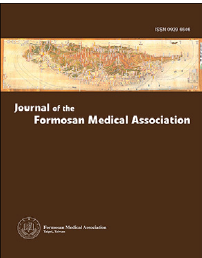Hsin-Ju Chiang, Kuo-Chung Lan, Yao-Hsu Yang, John Y. Chiang, Fu-Tsai Kung, Fu-Jen Huang, Yu-Ju Lin, Yu-Ting Su, Pei-Hsun Sung
Introduction
Endometriosis, characterized by extrauterine endometrial-like lesions, is a worldwide concern affecting many women of childbearing age. Approximately 10% of the general female
population has endometriosis that affects nearly 50% of women with infertility. Endometriosis is strongly associated with systemic inflammation, neovascularization, and tissue remodeling. Additionally, a recent study reported that endothelial dysfunction (ED) plays a crucial role in one of the pathological mechanisms underlying endometriosis.
The development of atherosclerotic cerebrovascular or cardiovascular disease (CVD), such as vascular dementia, coronary artery disease (CAD), and peripheral vascular disease, is closely related to systemic inflammation and ED. Therefore, in light of common pathological pathways of inflammation and ED, the phenomenon that emotional stress or with low level of anti-Mu¨llerian hormone (AMH) closely link to higher risk of CVD has been observed by several studies. Recently, data from the US Health Study II registry indicated that the risk of CAD is not only associated with endometriosis but also higher in patients with endometriosis who underwent hysterectomy or oophorectomy. The unfavorable effect of surgical treatment for endometriosis on the risk of CVD raised clinical safety concerns among operators, health care providers, and patients. Furthermore, hormonal treatment strategies for endometriosis, including gonadotropin-releasing hormone (GnRH) analogues, oral contraceptives, progesterone, and danazol, potentially or controversially increase the cardiovascular risk and yield inconsistent results. However, whether the aforementioned findings derived from Western countries can be generally applied to the Asian population and whether women with endometriosis receiving medical, surgical, or combined treatment have increased risks of major adverse cardiovascular and cerebrovascular events (MACCE) remain unanswered. Thus,
using the Taiwan National Health Insurance Research Database (NHIRD), we studied (1) the frequency/risk of MACCE and (2) the impact of endometriosis therapy on MACCE in Taiwanese women with endometriosis.
population has endometriosis that affects nearly 50% of women with infertility. Endometriosis is strongly associated with systemic inflammation, neovascularization, and tissue remodeling. Additionally, a recent study reported that endothelial dysfunction (ED) plays a crucial role in one of the pathological mechanisms underlying endometriosis.
The development of atherosclerotic cerebrovascular or cardiovascular disease (CVD), such as vascular dementia, coronary artery disease (CAD), and peripheral vascular disease, is closely related to systemic inflammation and ED. Therefore, in light of common pathological pathways of inflammation and ED, the phenomenon that emotional stress or with low level of anti-Mu¨llerian hormone (AMH) closely link to higher risk of CVD has been observed by several studies. Recently, data from the US Health Study II registry indicated that the risk of CAD is not only associated with endometriosis but also higher in patients with endometriosis who underwent hysterectomy or oophorectomy. The unfavorable effect of surgical treatment for endometriosis on the risk of CVD raised clinical safety concerns among operators, health care providers, and patients. Furthermore, hormonal treatment strategies for endometriosis, including gonadotropin-releasing hormone (GnRH) analogues, oral contraceptives, progesterone, and danazol, potentially or controversially increase the cardiovascular risk and yield inconsistent results. However, whether the aforementioned findings derived from Western countries can be generally applied to the Asian population and whether women with endometriosis receiving medical, surgical, or combined treatment have increased risks of major adverse cardiovascular and cerebrovascular events (MACCE) remain unanswered. Thus,
using the Taiwan National Health Insurance Research Database (NHIRD), we studied (1) the frequency/risk of MACCE and (2) the impact of endometriosis therapy on MACCE in Taiwanese women with endometriosis.
KEYWORDS
Endometriosis; Major adverse cardiovascular and cerebrovascular events; Population-based
J Formos Med Assoc. 2021 Jan;120(1 Pt 2):327-336. doi: 10.1016/j.jfma.2020.10.005. Epub 2020 Oct 22. PMID: 33268157.




